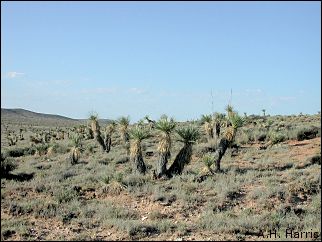

Some years ago, a study suggested that any two people on earth could be linked together by a web consisting of an average of only six people. The idea was that you knew people who knew other people, and so on—with the chain of acquaintances linking in only a few go-arounds. Although doubt has since been thrown on the accuracy of the figures, the idea coincides well with what goes on in any geographic area. One way or another, most or all of the plants and animals are linked together in a relatively few degrees of separation. This being the case, disturbance of any part of the community reverberates throughout.
In our desert landscapes, we often can pick up visual clues of such
snowballing effects. An especially dense stand of any of a variety of plants, such as
cholla cactus, Soaptree Yucca, broomweed, or mariola, may well be a tip-off that the
dynamic balance of the web has been ripped asunder. Their natural competitors
diminished by over-grazing, these less palatable plants now rule a depleted
kingdom.

Contributor: Arthur H. Harris, Laboratory for Environmental Biology, Centennial Museum, University of Texas at El Paso.
Desert Diary is a joint production of the Centennial Museum and KTEP National Public Radio at the University of Texas at El Paso.

Soaptree Yucca (Yucca elata) on the range, Hudspeth Co., TX. Photograph by A.H. Harris.
Whittaker, R. H. 1975. Communities and ecosystems. 2nd ed., Macmillan Publishing Co, Inc., New York. 385 pp.